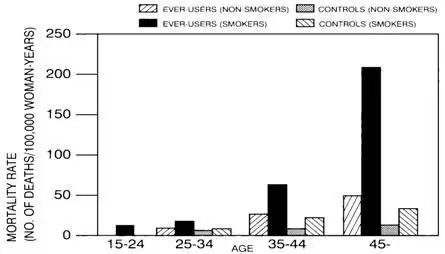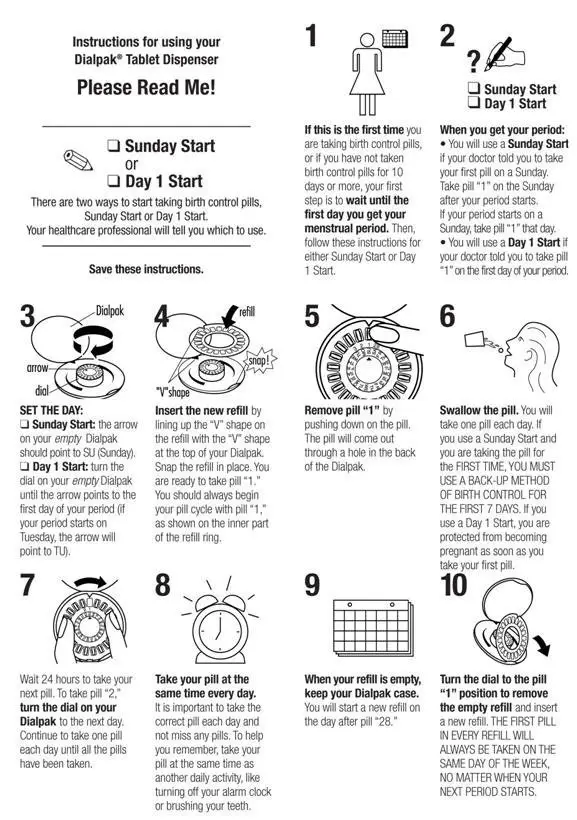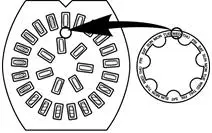Drug Class: Contraceptives Sex hormone combinations
WARNING: CARDIOVASCULAR RISK ASSOCIATED WITH SMOKING
Cigarette smoking increases the risk of serious cardiovascular events from combination oral contraceptive use. This risk increases with age, particularly in women over 35 years of age, and with the number of cigarettes smoked. For this reason, combination oral contraceptives, including ORTHO-NOVUM® and MODICON®, should not be used by women who are over 35 years of age and smoke.
Contraindications
Oral contraceptives should not be used in women who currently have the following conditions:
- Thrombophlebitis or thromboembolic disorders
- A past history of deep vein thrombophlebitis or thromboembolic disorders
- Known thrombophilic conditions
- Cerebral vascular or coronary artery disease (current or history)
- Valvular heart disease with complications
- Persistent blood pressure values of ≥ 160 mm Hg systolic or ≥ 100 mg Hg diastolic96
- Diabetes with vascular involvement
- Headaches with focal neurological symptoms
- Major surgery with prolonged immobilization
- Known or suspected carcinoma of the breast
- Carcinoma of the endometrium or other known or suspected estrogen-dependent neoplasia
- Undiagnosed abnormal genital bleeding
- Cholestatic jaundice of pregnancy or jaundice with prior pill use
- Acute or chronic hepatocellular disease with abnormal liver function
- Hepatic adenomas or carcinomas
- Known or suspected pregnancy
- Hypersensitivity to any component of this product
- Are receiving Hepatitis C drug combinations containing ombitasvir/paritaprevir/ritonavir, with or without dasabuvir, due to the potential for ALT elevations (see WARNINGS, Risk of Liver Enzyme Elevations with Concomitant Hepatitis C Treatment).
Warnings
Cigarette smoking increases the risk of serious cardiovascular events from combination oral contraceptive use. This risk increases with age, particularly in women over 35 years of age, and with the number of cigarettes smoked. For this reason, combination oral contraceptives, including ORTHO-NOVUM® and MODICON®, should not be used by women who are over 35 years of age and smoke.
The use of oral contraceptives is associated with increased risks of several serious conditions including myocardial infarction, thromboembolism, stroke, hepatic neoplasia, and gallbladder disease, although the risk of serious morbidity or mortality is very small in healthy women without underlying risk factors. The risk of morbidity and mortality increases significantly in the presence of other underlying risk factors such as hypertension, hyperlipidemias, obesity and diabetes.
Practitioners prescribing oral contraceptives should be familiar with the following information relating to these risks.
The information contained in this package insert is principally based on studies carried out in patients who used oral contraceptives with higher formulations of estrogens and progestogens than those in common use today. The effect of long-term use of the oral contraceptives with lower formulations of both estrogens and progestogens remains to be determined.
Throughout this labeling, epidemiological studies reported are of two types: retrospective or case control studies and prospective or cohort studies. Case control studies provide a measure of the relative risk of a disease, namely, a ratio of the incidence of a disease among oral contraceptive users to that among nonusers. The relative risk does not provide information on the actual clinical occurrence of a disease. Cohort studies provide a measure of attributable risk, which is the difference in the incidence of disease between oral contraceptive users and nonusers. The attributable risk does provide information about the actual occurrence of a disease in the population (adapted from refs. 2 and 3 with the author's permission). For further information, the reader is referred to a text on epidemiological methods.
1. Thromboembolic Disorders and Other Vascular Problems
a. Myocardial Infarction
An increased risk of myocardial infarction has been attributed to oral contraceptive use. This risk is primarily in smokers or women with other underlying risk factors for coronary artery disease such as hypertension, hypercholesterolemia, morbid obesity, and diabetes. The relative risk of heart attack for current oral contraceptive users has been estimated to be two to six.4–10 The risk is very low under the age of 30.
Smoking in combination with oral contraceptive use has been shown to contribute substantially to the incidence of myocardial infarctions in women in their mid-thirties or older with smoking accounting for the majority of excess cases.11 Mortality rates associated with circulatory disease have been shown to increase substantially in smokers, especially in those 35 years of age and older, and in nonsmokers over the age of 40 among women who use oral contraceptives. (See Figure 1).
Figure 1. Circulatory Disease Mortality Rates per 100,000 Women-Years by Age, Smoking Status and Oral Contraceptive Use
Oral contraceptives may compound the effects of well-known risk factors, such as hypertension, diabetes, hyperlipidemias, age and obesity.13 In particular, some progestogens are known to decrease HDL cholesterol and cause glucose intolerance, while estrogens may create a state of hyperinsulinism.14–18 Oral contraceptives have been shown to increase blood pressure among users (see Section 10 in WARNINGS). Similar effects on risk factors have been associated with an increased risk of heart disease. Oral contraceptives must be used with caution in women with cardiovascular disease risk factors.
d. Dose-related risk of vascular disease from oral contraceptives
A positive association has been observed between the amount of estrogen and progestogen in oral contraceptives and the risk of vascular disease.31–33 A decline in serum high density lipoproteins (HDL) has been reported with many progestational agents.14–16 A decline in serum high density lipoproteins has been associated with an increased incidence of ischemic heart disease. Because estrogens increase HDL cholesterol, the net effect of an oral contraceptive depends on a balance achieved between doses of estrogen and progestogen and the activity of the progestogen used in the contraceptives. The activity and amount of both hormones should be considered in the choice of an oral contraceptive.
Minimizing exposure to estrogen and progestogen is in keeping with good principles of therapeutics. For any particular estrogen/progestogen combination, the dosage regimen prescribed should be one which contains the least amount of estrogen and progestogen that is compatible with a low failure rate and the needs of the individual patient. New acceptors of oral contraceptive agents should be started on preparations containing the lowest estrogen content which is judged appropriate for the individual patient.
2. Estimates of Mortality from Contraceptive Use
One study gathered data from a variety of sources which have estimated the mortality rate associated with different methods of contraception at different ages (Table 2). These estimates include the combined risk of death associated with contraceptive methods plus the risk attributable to pregnancy in the event of method failure. Each method of contraception has its specific benefits and risks. The study concluded that with the exception of oral contraceptive users 35 and older who smoke, and 40 and older who do not smoke, mortality associated with all methods of birth control is low and below that associated with childbirth. The observation of an increase in risk of mortality with age for oral contraceptive users is based on data gathered in the 1970's.35 Current clinical recommendation involves the use of lower estrogen dose formulations and a careful consideration of risk factors. In 1989, the Fertility and Maternal Health Drugs Advisory Committee was asked to review the use of oral contraceptives in women 40 years of age and over. The Committee concluded that although cardiovascular disease risks may be increased with oral contraceptive use after age 40 in healthy non-smoking women (even with the newer low-dose formulations), there are also greater potential health risks associated with pregnancy in older women and with the alternative surgical and medical procedures which may be necessary if such women do not have access to effective and acceptable means of contraception. The Committee recommended that the benefits of low-dose oral contraceptive use by healthy non-smoking women over 40 may outweigh the possible risks.
Of course, older women, as all women who take oral contraceptives, should take an oral contraceptive which contains the least amount of estrogen and progestogen that is compatible with a low failure rate and individual patient needs.
| Method of control and outcome | 15–19 | 20–24 | 25–29 | 30–34 | 35–39 | 40–44 |
|---|---|---|---|---|---|---|
| Adapted from H.W. Ory, ref. #35. | ||||||
|
||||||
| No fertility-control methods* | 7.0 | 7.4 | 9.1 | 14.8 | 25.7 | 28.2 |
| Oral contraceptives non-smoker† | 0.3 | 0.5 | 0.9 | 1.9 | 13.8 | 31.6 |
| Oral contraceptives smoker† | 2.2 | 3.4 | 6.6 | 13.5 | 51.1 | 117.2 |
| IUD† | 0.8 | 0.8 | 1.0 | 1.0 | 1.4 | 1.4 |
| Condom* | 1.1 | 1.6 | 0.7 | 0.2 | 0.3 | 0.4 |
| Diaphragm/ spermicide* | 1.9 | 1.2 | 1.2 | 1.3 | 2.2 | 2.8 |
| Periodic abstinence* | 2.5 | 1.6 | 1.6 | 1.7 | 2.9 | 3.6 |
5. Risk of Liver Enzyme Elevations with Concomitant Hepatitis C Treatment
During clinical trials with the Hepatitis C combination drug regimen that contains ombitasvir/paritaprevir/ritonavir, with or without dasabuvir, ALT elevations greater than 5 times the upper limit of normal (ULN), including some cases greater than 20 times the ULN, were significantly more frequent in women using ethinyl estradiol-containing medications such as COCs. Discontinue ORTHO-NOVUM® or MODICON® prior to starting therapy with the combination drug regimen ombitasvir/paritaprevir/ritonavir, with or without dasabuvir (see CONTRAINDICATIONS). ORTHO-NOVUM® or MODICON® can be restarted approximately 2 weeks following completion of treatment with the combination drug regimen.
10. Elevated Blood Pressure
Women with significant hypertension should not be started on hormonal contraception.92 An increase in blood pressure has been reported in women taking oral contraceptives68 and this increase is more likely in older oral contraceptive users69 and with extended duration of use.61 Data from the Royal College of General Practitioners12 and subsequent randomized trials have shown that the incidence of hypertension increases with increasing progestational activity.
Women with a history of hypertension or hypertension-related diseases, or renal disease70 should be encouraged to use another method of contraception. If these women elect to use oral contraceptives, they should be monitored closely and if a clinically significant persistent elevation of blood pressure (BP) occurs (≥ 160 mm Hg systolic or ≥ 100 mm Hg diastolic) and cannot be adequately controlled, oral contraceptives should be discontinued. In general, women who develop hypertension during hormonal contraceptive therapy should be switched to a non-hormonal contraceptive. If other contraceptive methods are not suitable, hormonal contraceptive therapy may continue combined with antihypertensive therapy. Regular monitoring of BP throughout hormonal contraceptive therapy is recommended.96 For most women, elevated blood pressure will return to normal after stopping oral contraceptives, and there is no difference in the occurrence of hypertension between former and never users.68–71
Precautions
8. Drug Interactions
Consult the labeling of concurrently-used drugs to obtain further information about interactions with hormonal contraceptives or the potential for enzyme alterations.
Effects of Other Drugs on Combined Hormonal Contraceptives
12. Nursing Mothers
Small amounts of oral contraceptive steroids have been identified in the milk of nursing mothers and a few adverse effects on the child have been reported, including jaundice and breast enlargement. In addition, combined oral contraceptives given in the postpartum period may interfere with lactation by decreasing the quantity and quality of breast milk. If possible, the nursing mother should be advised not to use combined oral contraceptives but to use other forms of contraception until she has completely weaned her child.
DETAILED PATIENT LABELING
PLEASE NOTE: This labeling is revised from time to time as important new medical information becomes available. Therefore, please review this labeling carefully.
The following oral contraceptive products contain a combination of an estrogen and progestogen, the two kinds of female hormones:
ORTHO-NOVUM® 7/7/7
Each white tablet contains 0.5 mg norethindrone and 0.035 mg ethinyl estradiol. Each light peach tablet contains 0.75 mg norethindrone and 0.035 mg ethinyl estradiol. Each peach tablet contains 1 mg norethindrone and 0.035 mg ethinyl estradiol. Each green tablet contains inert ingredients.
ORTHO-NOVUM® 1/35
Each peach tablet contains 1 mg norethindrone and 0.035 mg ethinyl estradiol. Each green tablet contains inert ingredients.
MODICON®
Each white tablet contains 0.5 mg norethindrone and 0.035 mg ethinyl estradiol. Each green tablet contains inert ingredients.
INTRODUCTION
Any woman who considers using oral contraceptives (the birth control pill or the pill) should understand the benefits and risks of using this form of birth control. This patient labeling will give you much of the information you will need to make this decision and will also help you determine if you are at risk of developing any of the serious side effects of the pill. It will tell you how to use the pill properly so that it will be as effective as possible. However, this labeling is not a replacement for a careful discussion between you and your healthcare professional. You should discuss the information provided in this labeling with him or her, both when you first start taking the pill and during your revisits. You should also follow your healthcare professional's advice with regard to regular check-ups while you are on the pill.
EFFECTIVENESS OF ORAL CONTRACEPTIVES
Oral contraceptives or "birth control pills" or "the pill" are used to prevent pregnancy and are more effective than other non-surgical methods of birth control. When they are taken correctly without missing any pills, the chance of becoming pregnant is approximately 1% (1 pregnancy per 100 women per year of use). Typical failure rates are approximately 5% per year including women who do not always take the pills exactly as directed. The chance of becoming pregnant increases with each missed pill during a menstrual cycle.
In comparison, typical failure rates for other methods of birth control during the first year of use are as follows:
| Implant: <1% Injection: <1% IUD: 1 to 2% Diaphragm with spermicides: 20% Spermicides alone: 26% Vaginal sponge: 20 to 40% Female sterilization: <1% | Male sterilization: <1% Cervical Cap with spermicides: 20 to 40% Condom alone (male): 14% Condom alone (female): 21% Periodic abstinence: 25% Withdrawal: 19% No methods: 85% |
WHO SHOULD NOT TAKE ORAL CONTRACEPTIVES
| Do not use ORTHO-NOVUM® or MODICON® if you smoke cigarettes and are over 35 years old. Smoking increases your risk of serious cardiovascular side effects (heart and blood vessel problems) from combination oral contraceptives, including death from heart attack, blood clots or stroke. This risk increases with age and the number of cigarettes you smoke. |
Some women should not use the pill. For example, you should not take the pill if you have any of the following conditions:
- A history of heart attack or stroke
- Blood clots in the legs (thrombophlebitis), lungs (pulmonary embolism), or eyes
- A history of blood clots in the deep veins of your legs
- An inherited problem that makes your blood clot more than normal
- Chest pain (angina pectoris)
- Known or suspected breast cancer or cancer of the lining of the uterus, cervix or vagina
- Unexplained vaginal bleeding (until a diagnosis is reached by your healthcare professional)
- Yellowing of the whites of the eyes or of the skin (jaundice) during pregnancy or during previous use of the pill
- Liver tumor (benign or cancerous)
- Take any Hepatitis C drug combination containing ombitasvir/paritaprevir/ ritonavir, with or without dasabuvir. This may increase levels of the liver enzyme "alanine aminotransferase" (ALT) in the blood.
- Known or suspected pregnancy
- Valvular heart disease with complications
- Severe hypertension
- Diabetes with vascular involvement
- Headaches with focal neurological symptoms
- If you plan to have surgery with prolonged bed rest
- Hypersensitivity to any component of this product.
Tell your healthcare professional if you have ever had any of these conditions. Your healthcare professional can recommend a safer method of birth control.
OTHER CONSIDERATIONS BEFORE TAKING ORAL CONTRACEPTIVES
Tell your healthcare professional if you have or have had:
- Breast nodules, fibrocystic disease of the breast, an abnormal breast x-ray or mammogram
- Diabetes
- Elevated cholesterol or triglycerides
- High blood pressure
- Migraine or other headaches or epilepsy
- Mental depression
- Gallbladder, liver, heart or kidney disease
- History of scanty or irregular menstrual periods
Women with any of these conditions should be checked often by their healthcare professional if they choose to use oral contraceptives.
Also, be sure to inform your healthcare professional if you smoke or are on any medications.
RISKS OF TAKING ORAL CONTRACEPTIVES
- 1.
- Risk of developing blood clots
Blood clots and blockage of blood vessels are one of the most serious side effects of taking oral contraceptives and can cause death or serious disability. Serious blood clots can happen especially if you smoke, are obese, or are older than 35 years of age. Serious blood clots are more likely to happen when you:
- First start taking birth control pills
- Restart the same or different birth control pills after not using them for a month or more
In particular, a clot in the legs can cause thrombophlebitis and a clot that travels to the lungs can cause a sudden blocking of the vessel carrying blood to the lungs. Rarely, clots occur in the blood vessels of the eye and may cause blindness, double vision, or impaired vision.
If you take oral contraceptives and need elective surgery, need to stay in bed for a prolonged illness or injury or have recently delivered a baby, you may be at risk of developing blood clots. You should consult your healthcare professional about stopping oral contraceptives three to four weeks before surgery and not taking oral contraceptives for two weeks after surgery or during bed rest. You should also not take oral contraceptives soon after delivery of a baby. It is advisable to wait for at least four weeks after delivery if you are not breastfeeding or four weeks after a second trimester abortion. If you are breastfeeding, you should wait until you have weaned your child before using the pill. (See also the section on Breastfeeding in General Precautions.)
The risk of circulatory disease in oral contraceptive users may be higher in users of high-dose pills and may be greater with longer duration of oral contraceptive use. In addition, some of these increased risks may continue for a number of years after stopping oral contraceptives. The risk of abnormal blood clotting increases with age in both users and nonusers of oral contraceptives, but the increased risk from the oral contraceptive appears to be present at all ages. For women aged 20 to 44, it is estimated that about 1 in 2,000 using oral contraceptives will be hospitalized each year because of abnormal clotting. Among nonusers in the same age group, about 1 in 20,000 would be hospitalized each year. For oral contraceptive users in general, it has been estimated that in women between the ages of 15 and 34 the risk of death due to a circulatory disorder is about 1 in 12,000 per year, whereas for nonusers the rate is about 1 in 50,000 per year. In the age group 35 to 44, the risk is estimated to be about 1 in 2,500 per year for oral contraceptive users and about 1 in 10,000 per year for nonusers.
- 2.
- Heart attacks and strokes
Oral contraceptives may increase the tendency to develop strokes (stoppage or rupture of blood vessels in the brain) and angina pectoris and heart attacks (blockage of blood vessels in the heart). Any of these conditions can cause death or serious disability.
Smoking greatly increases the possibility of suffering heart attacks and strokes. Furthermore, smoking and the use of oral contraceptives greatly increase the chances of developing and dying of heart disease.
- 3.
- Gallbladder disease
Oral contraceptive users probably have a greater risk than nonusers of having gallbladder disease, although this risk may be related to pills containing high doses of estrogens.
- 4.
- Liver tumors
In rare cases, oral contraceptives can cause benign but dangerous liver tumors. These benign liver tumors can rupture and cause fatal internal bleeding. In addition, some studies report an increased risk of developing liver cancer. However, liver cancers are rare.
- 5.
- Cancer of the reproductive organs and breasts
Various studies give conflicting reports on the relationship between breast cancer and oral contraceptive use. Oral contraceptive use may slightly increase your chance of having breast cancer diagnosed, particularly after using hormonal contraceptives at a younger age. After you stop using hormonal contraceptives, the chances of having breast cancer diagnosed begin to go back down. You should have regular breast examinations by a healthcare professional and examine your own breasts monthly. Tell your healthcare professional if you have a family history of breast cancer or if you have had breast nodules or an abnormal mammogram. Women who currently have or have had breast cancer should not use oral contraceptives because breast cancer is usually a hormone-sensitive tumor.
Some studies have found an increase in the incidence of cancer of the cervix in women who use oral contraceptives. However, this finding may be related to factors other than the use of oral contraceptives. There is insufficient evidence to rule out the possibility that the pill may cause such cancers.
ESTIMATED RISK OF DEATH FROM A BIRTH CONTROL METHOD OR PREGNANCY
All methods of birth control and pregnancy are associated with a risk of developing certain diseases which may lead to disability or death. An estimate of the number of deaths associated with different methods of birth control and pregnancy has been calculated and is shown in the following table.
| Method of control and outcome | 15–19 | 20–24 | 25–29 | 30–34 | 35–39 | 40–44 |
|---|---|---|---|---|---|---|
|
||||||
| No fertility-control methods* | 7.0 | 7.4 | 9.1 | 14.8 | 25.7 | 28.2 |
| Oral contraceptives non-smoker† | 0.3 | 0.5 | 0.9 | 1.9 | 13.8 | 31.6 |
| Oral contraceptives smoker† | 2.2 | 3.4 | 6.6 | 13.5 | 51.1 | 117.2 |
| IUD† | 0.8 | 0.8 | 1.0 | 1.0 | 1.4 | 1.4 |
| Condom* | 1.1 | 1.6 | 0.7 | 0.2 | 0.3 | 0.4 |
| Diaphragm/ spermicide* | 1.9 | 1.2 | 1.2 | 1.3 | 2.2 | 2.8 |
| Periodic abstinence* | 2.5 | 1.6 | 1.6 | 1.7 | 2.9 | 3.6 |
In the above table, the risk of death from any birth control method is less than the risk of childbirth, except for oral contraceptive users over the age of 35 who smoke and pill users over the age of 40 even if they do not smoke. It can be seen in the table that for women aged 15 to 39, the risk of death was highest with pregnancy (7-26 deaths per 100,000 women, depending on age). Among pill users who do not smoke, the risk of death was always lower than that associated with pregnancy for any age group, although over the age of 40, the risk increases to 32 deaths per 100,000 women, compared to 28 associated with pregnancy at that age. However, for pill users who smoke and are over the age of 35, the estimated number of deaths exceeds those for other methods of birth control. If a woman is over the age of 40 and smokes, her estimated risk of death is four times higher (117/100,000 women) than the estimated risk associated with pregnancy (28/100,000 women) in that age group.
The suggestion that women over 40 who do not smoke should not take oral contraceptives is based on information from older, higher-dose pills. An Advisory Committee of the FDA discussed this issue in 1989 and recommended that the benefits of low-dose oral contraceptive use by healthy, non-smoking women over 40 years of age may outweigh the possible risks.
WARNING SIGNALS
If any of these adverse effects occur while you are taking oral contraceptives, call your healthcare professional immediately:
- Sharp chest pain, coughing of blood, or sudden shortness of breath (indicating a possible clot in the lung)
- Pain in the calf (indicating a possible clot in the leg)
- Crushing chest pain or heaviness in the chest (indicating a possible heart attack)
- Sudden severe headache or vomiting, dizziness or fainting, disturbances of vision or speech, weakness, or numbness in an arm or leg (indicating a possible stroke)
- Sudden partial or complete loss of vision (indicating a possible clot in the eye)
- Breast lumps (indicating possible breast cancer or fibrocystic disease of the breast; ask your healthcare professional to show you how to examine your breasts)
- Severe pain or tenderness in the stomach area (indicating a possibly ruptured liver tumor)
- Difficulty in sleeping, weakness, lack of energy, fatigue, or change in mood (possibly indicating severe depression)
- Jaundice or a yellowing of the skin or eyeballs, accompanied frequently by fever, fatigue, loss of appetite, dark colored urine, or light colored bowel movements (indicating possible liver problems)
SIDE EFFECTS OF ORAL CONTRACEPTIVES
1. Vaginal bleeding
Irregular vaginal bleeding or spotting may occur while you are taking the pills. Irregular bleeding may vary from slight staining between menstrual periods to breakthrough bleeding which is a flow much like a regular period. Irregular bleeding occurs most often during the first few months of oral contraceptive use, but may also occur after you have been taking the pill for some time. Such bleeding may be temporary and usually does not indicate any serious problems. It is important to continue taking your pills on schedule. If the bleeding occurs in more than one cycle or lasts for more than a few days, talk to your healthcare professional.
2. Contact lenses
If you wear contact lenses and notice a change in vision or an inability to wear your lenses, contact your healthcare professional.
3. Fluid retention
Oral contraceptives may cause edema (fluid retention) with swelling of the fingers or ankles and may raise your blood pressure. If you experience fluid retention, contact your healthcare professional.
4. Melasma
A spotty darkening of the skin is possible, particularly of the face, which may persist.
5. Other side effects
Other side effects may include nausea, vomiting and diarrhea, muscle cramps, change in appetite, headache, nervousness, depression, dizziness, loss of scalp hair, rash, vaginal infections, pancreatitis, skin sensitivity to the sun or ultraviolet and allergic reactions.
If any of these side effects bother you, call your healthcare professional.
GENERAL PRECAUTIONS
1. Missed periods and use of oral contraceptives before or during early pregnancy
There may be times when you may not menstruate regularly after you have completed taking a cycle of pills. If you have taken your pills regularly and miss one menstrual period, continue taking your pills for the next cycle but be sure to inform your healthcare professional before doing so. If you have not taken the pills daily as instructed and missed a menstrual period, you may be pregnant. If you missed two consecutive menstrual periods, you may be pregnant. Check with your healthcare professional immediately to determine whether you are pregnant. Do not continue to take oral contraceptives until you are sure you are not pregnant, but continue to use another method of contraception.
There is no conclusive evidence that oral contraceptive use is associated with an increase in birth defects, when taken inadvertently during early pregnancy. Previously, a few studies had reported that oral contraceptives might be associated with birth defects, but these findings have not been seen in more recent studies. Nevertheless, oral contraceptives should not be used during pregnancy. You should check with your healthcare professional about risks to your unborn child of any medication taken during pregnancy.
2. While breastfeeding
If you are breastfeeding, consult your healthcare professional before starting oral contraceptives. Some of the drug will be passed on to the child in the milk. A few adverse effects on the child have been reported, including yellowing of the skin (jaundice) and breast enlargement. In addition, combined oral contraceptives may decrease the amount and quality of your milk. If possible, do not use combined oral contraceptives while breastfeeding. You should use another method of contraception since breastfeeding provides only partial protection from becoming pregnant and this partial protection decreases significantly as you breastfeed for longer periods of time. You should consider starting combined oral contraceptives only after you have weaned your child completely.
3. Laboratory tests
If you are scheduled for any laboratory tests, tell your healthcare professional you are taking birth control pills. Certain blood tests may be affected by birth control pills.
4. Drug interactions
Tell your healthcare provider about all medicines and herbal products that you take.
Some medicines and herbal products may make hormonal birth control less effective, including, but not limited to:
- certain seizure medicines (carbamazepine, felbamate, oxcarbazepine, phenytoin, rufinamide, and topiramate)
- aprepitant
- barbiturates
- bosentan
- colesevelam
- griseofulvin
- certain combinations of HIV medicines (nelfinavir, ritonavir, ritonavir-boosted protease inhibitors)
- certain non-nucleoside reverse transcriptase inhibitors (nevirapine)
- rifampin and rifabutin
- St. John's wort
Use another birth control method (such as a condom and spermicide or diaphragm and spermicide) when you take medicines that may make ORTHO-NOVUM® 7/7/7, ORTHO-NOVUM® 1/35, or MODICON® less effective.
Some medicines and grapefruit juice may increase your level of the hormone ethinyl estradiol if used together, including:
- acetaminophen
- ascorbic acid
- medicines that affect how your liver breaks down other medicines (itraconazole, ketoconazole, voriconazole, and fluconazole)
- certain HIV medicines (atazanavir, indinavir)
- atorvastatin
- rosuvastatin
- etravirine
Hormonal birth control methods may interact with lamotrigine, a seizure medicine used for epilepsy. This may increase the risk of seizures, so your healthcare provider may need to adjust the dose of lamotrigine.
Women on thyroid replacement therapy may need increased doses of thyroid hormone.
Know the medicines you take. Keep a list of them to show your doctor and pharmacist when you get a new medicine.
5. Sexually transmitted diseases
This product (like all oral contraceptives) is intended to prevent pregnancy. It does not protect against transmission of HIV (AIDS) and other sexually transmitted diseases such as chlamydia, genital herpes, genital warts, gonorrhea, hepatitis B, and syphilis.
HOW TO TAKE THE PILL
| IMPORTANT POINTS TO REMEMBER |
BEFORE YOU START TAKING YOUR PILLS:
- BE SURE TO READ THESE DIRECTIONS:
Before you start taking your pills.
Anytime you are not sure what to do. - THE RIGHT WAY TO TAKE THE PILL IS TO TAKE ONE PILL EVERY DAY AT THE SAME TIME.
If you miss pills you could get pregnant. This includes starting the pack late.
The more pills you miss, the more likely you are to get pregnant. - MANY WOMEN HAVE SPOTTING OR LIGHT BLEEDING, OR MAY FEEL SICK TO THEIR STOMACH DURING THE FIRST 1-3 PACKS OF PILLS. If you feel sick to your stomach, do not stop taking the pill. The problem will usually go away. If it doesn't go away, check with your healthcare professional.
- MISSING PILLS CAN ALSO CAUSE SPOTTING OR LIGHT BLEEDING, even when you make up these missed pills. On the days you take 2 pills to make up for missed pills, you could also feel a little sick to your stomach.
- IF YOU HAVE VOMITING OR DIARRHEA, or IF YOU TAKE SOME MEDICINES, your pills may not work as well. Use a back-up method (such as a condom or spermicide) until you check with your healthcare professional.
- IF YOU HAVE TROUBLE REMEMBERING TO TAKE THE PILL, talk to your healthcare professional about how to make pill taking easier or about using another method of birth control.
- IF YOU HAVE ANY QUESTIONS OR ARE UNSURE ABOUT THE INFORMATION IN THIS LEAFLET, call your healthcare professional.
| BEFORE YOU START TAKING YOUR PILLS |
- DECIDE WHAT TIME OF DAY YOU WANT TO TAKE YOUR PILL.
It is important to take it at about the same time every day.
- LOOK AT YOUR PILL PACK.
The pill pack has 21 "active" pills (with hormones) to take for 3 weeks. This is followed by 1 week of green "reminder" pills (without hormones).
ORTHO-NOVUM® 7/7/7: There are 7 white "active" pills, 7 light peach "active" pills, 7 peach "active" pills and 7 green "reminder" pills.
ORTHO-NOVUM® 1/35: There are 21 peach "active" pills and 7 green "reminder" pills.
MODICON®: There are 21 white "active" pills and 7 green "reminder" pills.
- ALSO FIND:
- 1)
- where on the pack to start taking pills,
- 2)
- in what order to take the pills.
CHECK PICTURE OF PILL PACK AND ADDITIONAL INSTRUCTIONS FOR USING THIS PACKAGE IN THE BRIEF SUMMARY PATIENT PACKAGE INSERT.
- BE SURE YOU HAVE READY AT ALL TIMES:
ANOTHER KIND OF BIRTH CONTROL (such as a condom or spermicide) to use as a back-up method in case you miss pills.
AN EXTRA, FULL PILL PACK.
| WHEN TO START THE FIRST PACK OF PILLS |
You have a choice of which day to start taking your first pack of pills. ORTHO-NOVUM® 7/7/7, ORTHO-NOVUM® 1/35, and MODICON® are available with the DIALPAK® or VERIDATE® Tablet Dispenser which is preset for a Sunday Start. Day 1 Start is also provided. Decide with your healthcare professional which is the best day for you. Pick a time of day that will be easy to remember.
SUNDAY START:
ORTHO-NOVUM® 7/7/7: Take the first white "active" pill of the first pack on the Sunday after your period starts, even if you are still bleeding. If your period begins on Sunday, start the pack the same day.
ORTHO-NOVUM® 1/35: Take the first peach "active" pill of the first pack on the Sunday after your period starts, even if you are still bleeding. If your period begins on Sunday, start the pack the same day.
MODICON®: Take the first white "active" pill of the first pack on the Sunday after your period starts, even if you are still bleeding. If your period begins on Sunday, start the pack the same day.
Use another method of birth control such as a condom or spermicide as a back-up method if you have sex anytime from the Sunday you start your first pack until the next Sunday (7 days).
DAY 1 START:
ORTHO-NOVUM® 7/7/7: Take the first white "active" pill of the first pack during the first 24 hours of your period.
ORTHO-NOVUM® 1/35: Take the first peach "active" pill of the first pack during the first 24 hours of your period.
MODICON®: Take the first white "active" pill of the first pack during the first 24 hours of your period.
You will not need to use a back-up method of birth control, since you are starting the pill at the beginning of your period.
| WHAT TO DO DURING THE MONTH |
- 1.
-
TAKE ONE PILL AT THE SAME TIME EVERY DAY UNTIL THE PACK IS EMPTY.
Do not skip pills even if you are spotting or bleeding between monthly periods or feel sick to your stomach (nausea). Do not skip pills even if you do not have sex very often. - 2.
-
WHEN YOU FINISH A PACK OR SWITCH YOUR BRAND OF PILLS:
Start the next pack on the day after your last green "reminder" pill. Do not wait any days between packs.
| WHAT TO DO IF YOU MISS PILLS |
ORTHO-NOVUM® 7/7/7:
If you MISS 1 white, light peach, or peach "active" pill:
- Take it as soon as you remember. Take the next pill at your regular time. This means you may take 2 pills in 1 day.
- You do not need to use a back-up birth control method if you have sex.
If you MISS 2 white or light peach "active" pills in a row in WEEK 1 OR WEEK 2 of your pack:
- Take 2 pills on the day you remember and 2 pills the next day.
- Then take 1 pill a day until you finish the pack.
- You COULD BECOME PREGNANT if you have sex in the 7 days after you miss pills. You MUST use another birth control method (such as a condom or spermicide) as a back-up method for those 7 days.
If you MISS 2 peach "active" pills in a row in THE 3RD WEEK:
- 1a.
- If you are a Sunday Starter:
Keep taking 1 pill every day until Sunday. On Sunday, THROW OUT the rest of the pack and start a new pack of pills that same day.
- 1b.
- If you are a Day 1 Starter:
THROW OUT the rest of the pill pack and start a new pack that same day.
- 2.
- You may not have your period this month but this is expected. However, if you miss your period 2 months in a row, call your healthcare professional because you might be pregnant.
- 3.
- You COULD BECOME PREGNANT if you have sex in the 7 days after you miss pills. You MUST use another birth control method (such as a condom or spermicide) as a back-up method for those 7 days.
If you MISS 3 OR MORE white, light peach, or peach "active" pills in a row (during the first 3 weeks):
- 1a.
- If you are a Sunday Starter:
Keep taking 1 pill every day until Sunday. On Sunday, THROW OUT the rest of the pack and start a new pack of pills that same day.
- 1b.
- If you are a Day 1 Starter:
THROW OUT the rest of the pill pack and start a new pack that same day.
- 2.
- You may not have your period this month but this is expected. However, if you miss your period 2 months in a row, call your healthcare professional because you might be pregnant.
- 3.
- You COULD BECOME PREGNANT if you have sex in the 7 days after you miss pills. You MUST use another birth control method (such as a condom or spermicide) as a back-up method for those 7 days.
ORTHO-NOVUM® 1/35:
If you MISS 1 peach "active" pill:
- Take it as soon as you remember. Take the next pill at your regular time. This means you may take 2 pills in 1 day.
- You do not need to use a back-up birth control method if you have sex.
If you MISS 2 peach "active" pills in a row in WEEK 1 OR WEEK 2 of your pack:
- Take 2 pills on the day you remember and 2 pills the next day.
- Then take 1 pill a day until you finish the pack.
- You COULD BECOME PREGNANT if you have sex in the 7 days after you miss pills. You MUST use another birth control method (such as a condom or spermicide) as a back-up method for those 7 days.
If you MISS 2 peach "active" pills in a row in THE 3RD WEEK:
- 1a.
- If you are a Sunday Starter:
Keep taking 1 pill every day until Sunday. On Sunday, THROW OUT the rest of the pack and start a new pack of pills that same day.
- 1b.
- If you are a Day 1 Starter:
THROW OUT the rest of the pill pack and start a new pack that same day.
- 2.
- You may not have your period this month but this is expected. However, if you miss your period 2 months in a row, call your healthcare professional because you might be pregnant.
- 3.
- You COULD BECOME PREGNANT if you have sex in the 7 days after you miss pills. You MUST use another birth control method (such as a condom or spermicide) as a back-up method for those 7 days.
If you MISS 3 OR MORE peach "active" pills in a row (during the first 3 weeks):
- 1a.
- If you are a Sunday Starter:
Keep taking 1 pill every day until Sunday. On Sunday, THROW OUT the rest of the pack and start a new pack of pills that same day.
- 1b.
- If you are a Day 1 Starter:
THROW OUT the rest of the pill pack and start a new pack that same day.
- 2.
- You may not have your period this month but this is expected. However, if you miss your period 2 months in a row, call your healthcare professional because you might be pregnant.
- 3.
- You COULD BECOME PREGNANT if you have sex in the 7 days after you miss pills. You MUST use another birth control method (such as a condom or spermicide) as a back-up method for those 7 days.
MODICON®:
If you MISS 1 white "active" pill:
- 1.
- Take it as soon as you remember. Take the next pill at your regular time. This means you may take 2 pills in 1 day.
- 2.
- You do not need to use a back-up birth control method if you have sex.
If you MISS 2 white "active" pills in a row in WEEK 1 OR WEEK 2 of your pack:
- 1.
- Take 2 pills on the day you remember and 2 pills the next day.
- 2.
- Then take 1 pill a day until you finish the pack.
- 3.
- You COULD BECOME PREGNANT if you have sex in the 7 days after you miss pills. You MUST use another birth control method (such as a condom or spermicide) as a back-up method for those 7 days.
If you MISS 2 white "active" pills in a row in THE 3RD WEEK:
- 1a.
-
If you are a Sunday Starter:
Keep taking 1 pill every day until Sunday. On Sunday, THROW OUT the rest of the pack and start a new pack of pills that same day. - 1b.
-
If you are a Day 1 Starter:
THROW OUT the rest of the pill pack and start a new pack that same day. - 2.
- You may not have your period this month but this is expected. However, if you miss your period 2 months in a row, call your healthcare professional because you might be pregnant.
- 3.
- You COULD BECOME PREGNANT if you have sex in the 7 days after you miss pills. You MUST use another birth control method (such as a condom or spermicide) as a back-up method for those 7 days.
If you MISS 3 OR MORE white "active" pills in a row (during the first 3 weeks):
- 1a.
-
If you are a Sunday Starter:
Keep taking 1 pill every day until Sunday. On Sunday, THROW OUT the rest of the pack and start a new pack of pills that same day. - 1b.
-
If you are a Day 1 Starter:
THROW OUT the rest of the pill pack and start a new pack that same day. - 2.
- You may not have your period this month but this is expected. However, if you miss your period 2 months in a row, call your healthcare professional because you might be pregnant.
- 3.
- You COULD BECOME PREGNANT if you have sex in the 7 days after you miss pills. You MUST use another birth control method (such as a condom or spermicide) as a back-up method for those 7 days.
| A REMINDER |
| If you forget any of the 7 green "reminder" pills in Week 4: THROW AWAY the pills you missed. Keep taking 1 pill each day until the pack is empty. You do not need a back-up method. |
| FINALLY, IF YOU ARE STILL NOT SURE WHAT TO DO ABOUT THE PILLS YOU HAVE MISSED: |
| Use a BACK-UP METHOD anytime you have sex. KEEP TAKING ONE "ACTIVE" PILL EACH DAY until you can reach your healthcare professional. |
PREGNANCY DUE TO PILL FAILURE
Combined Oral Contraceptives
The incidence of pill failure resulting in pregnancy is approximately one percent (i.e., one pregnancy per 100 women per year) if taken every day as directed, but more typical failure rates are 5%. If failure does occur, the risk to the fetus is minimal.
PREGNANCY AFTER STOPPING THE PILL
There may be some delay in becoming pregnant after you stop using oral contraceptives, especially if you had irregular menstrual cycles before you used oral contraceptives. It may be advisable to postpone conception until you begin menstruating regularly once you have stopped taking the pill and desire pregnancy.
There does not appear to be any increase in birth defects in newborn babies when pregnancy occurs soon after stopping the pill.
OVERDOSAGE
Serious ill effects have not been reported following ingestion of large doses of oral contraceptives by young children. Overdosage may cause nausea and withdrawal bleeding in females. In case of overdosage, contact your healthcare professional or pharmacist.
OTHER INFORMATION
Your healthcare professional will take a medical and family history before prescribing oral contraceptives and will examine you. The physical examination may be delayed to another time if you request it and the healthcare professional believes that it is a good medical practice to postpone it. You should be reexamined at least once a year. Be sure to inform your healthcare professional if there is a family history of any of the conditions listed previously in this leaflet. Be sure to keep all appointments with your healthcare professional, because this is a time to determine if there are early signs of side effects of oral contraceptive use.
Do not use the drug for any condition other than the one for which it was prescribed. This drug has been prescribed specifically for you; do not give it to others who may want birth control pills.
HEALTH BENEFITS FROM ORAL CONTRACEPTIVES
In addition to preventing pregnancy, use of combined oral contraceptives may provide certain benefits. They are:
- menstrual cycles may become more regular
- blood flow during menstruation may be lighter and less iron may be lost. Therefore, anemia due to iron deficiency is less likely to occur.
- pain or other symptoms during menstruation may be encountered less frequently
- ectopic (tubal) pregnancy may occur less frequently
- noncancerous cysts or lumps in the breast may occur less frequently
- acute pelvic inflammatory disease may occur less frequently
- oral contraceptive use may provide some protection against developing two forms of cancer: cancer of the ovaries and cancer of the lining of the uterus.
If you want more information about birth control pills, ask your healthcare professional or pharmacist. They have a more technical leaflet called the Professional Labeling, which you may wish to read.
Store at 25°C (77°F); excursions permitted to 15°–30°C (59°–86°F).
Keep out of the reach of children.
| ORTHO-NOVUM
777
norethindrone and ethinyl estradiol kit |
||||||||||||||||||||||||||||||||||||||||
|
||||||||||||||||||||||||||||||||||||||||
|
||||||||||||||||||||||||||||||||||||||||
|
||||||||||||||||||||||||||||||||||||||||
|
||||||||||||||||||||||||||||||||||||||||
|
||||||||||||||||||||||||||||||||||||||||
|
||||||||||||||||||||||||||||||||||||||||
|
||||||||||||||||||||||||||||||||||||||||
|
||||||||||||||||||||||||||||||||||||||||
|
||||||||||||||||||||||||||||||||||||||||
|
||||||||||||||||||||||||||||||||||||||||
|
||||||||||||||||||||||||||||||||||||||||
|
||||||||||||||||||||||||||||||||||||||||
|
||||||||||||||||||||||||||||||||||||||||
|
||||||||||||||||||||||||||||||||||||||||
|
||||||||||||||||||||||||||||||||||||||||
|
||||||||||||||||||||||||||||||||||||||||
|
||||||||||||||||||||||||||||||||||||||||
|
||||||||||||||||||||||||||||||||||||||||
|
||||||||||||||||||||||||||||||||||||||||
|
||||||||||||||||||||||||||||||||||||||||
|
||||||||||||||||||||||||||||||||||||||||
|
||||||||||||||||||||||||||||||||||||||||
|
||||||||||||||||||||||||||||||||||||||||
|
||||||||||||||||||||||||||||||||||||||||
|
||||||||||||||||||||||||||||||||||||||||
|
||||||||||||||||||||||||||||||||||||||||
|
||||||||||||||||||||||||||||||||||||||||
| ORTHO NOVUM
135
norethindrone and ethinyl estradiol kit |
||||||||||||||||||||
|
||||||||||||||||||||
|
||||||||||||||||||||
|
||||||||||||||||||||
|
||||||||||||||||||||
|
||||||||||||||||||||
|
||||||||||||||||||||
|
||||||||||||||||||||
|
||||||||||||||||||||
|
||||||||||||||||||||
|
||||||||||||||||||||
|
||||||||||||||||||||
|
||||||||||||||||||||
|
||||||||||||||||||||
|
||||||||||||||||||||
|
||||||||||||||||||||
| Labeler - Janssen Pharmaceuticals, Inc. (063137772) |
| Establishment | |||
| Name | Address | ID/FEI | Business Operations |
|---|---|---|---|
| Janssen Ortho LLC | 805887986 | ANALYSIS(50458-178, 50458-176) | |
| Establishment | |||
| Name | Address | ID/FEI | Business Operations |
|---|---|---|---|
| Ortho Biologics LLC | 606111821 | ANALYSIS(50458-178, 50458-176) | |
| Establishment | |||
| Name | Address | ID/FEI | Business Operations |
|---|---|---|---|
| Janssen Ortho LLC | 084894661 | MANUFACTURE(50458-178, 50458-176) | |
| Establishment | |||
| Name | Address | ID/FEI | Business Operations |
|---|---|---|---|
| Janssen Pharmaceuticals, Inc. | 063137772 | ANALYSIS(50458-178, 50458-176) | |
| Establishment | |||
| Name | Address | ID/FEI | Business Operations |
|---|---|---|---|
| Aspen Oss B.V. | 491013870 | API MANUFACTURE(50458-178, 50458-176) | |
| Establishment | |||
| Name | Address | ID/FEI | Business Operations |
|---|---|---|---|
| Aspen Oss B.V. | 491017488 | API MANUFACTURE(50458-178, 50458-176) | |


















